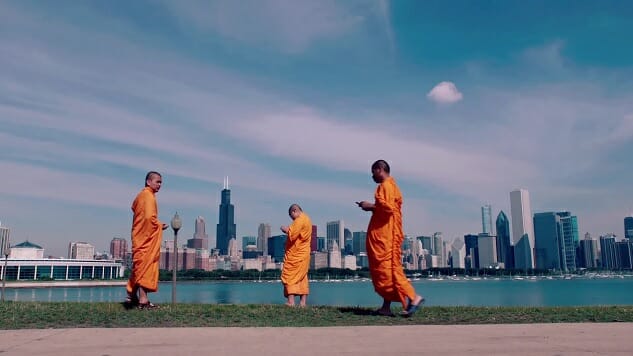Lo and Behold, Reveries of the Connected World

You didn’t expect a Werner Herzog documentary about the significance of the internet in our daily lives, and how it might alter our future, to fall in the ballpark of “cheerful,” did you? It’s probably too much to hope for the film, now in theaters under the poetic moniker of Lo and Behold, Reveries of the Connected World, to be playful, or cheeky, though it is both of these things when not engaged with bleaker affairs, like internet addiction, embodied via obsessive World of Warcraft play, or the Nikki Catsouras incident. “But who is going to be liable in case of an accident?” Herzog muses on the topic of self-driving cars. “The onboard computer? Its designer? The GPS system? The internet? Or the driver, who eats his breakfast?” Classic Herzog.
Here, Herzog is possibly referencing instances of real life stupidity as caught on tape, but the line strikes us as oddball and humorous when spoken in context all the same. (And that, perhaps, is classic Herzog.) But Lo and Behold, Reveries of the Connected World doesn’t exist to indulge memeification of the German New Wave maestro, perhaps surprisingly given its relationship to the comings and goings of plugged-in culture. Instead, the film is often gloomy in a funereal sense, not because Herzog is reactionary enough to declare the premature demise of the internet, and the ever-evolving human identities that are couched within it, but because this is how he operates. Somber ruminations about our place in the grand scheme of the universe are his jam, and hoo boy, is Lo and Behold somber.
The film begins at the beginning, with the birth of the internet in the halls of UCLA all the way back in October of 1969, and from there expands into a 10-chapter exploration of where our increasing reliance on web-based interaction is taking us, each chapter named with ominous concision: “Earthly Invaders,” “The Dark Side,” “Life Without the Net,” “The End of the Net.” In speaking to the Catsouras family about the online harassment they endured following Nikki’s death, as well as in the interviews he conducts with law professors, cosmologists, astronomers, security analysts and the hacker king himself, Kevin Mitnick, Herzog considers perspectives on the internet’s inherent dangers: Mrs. Catsouras tells him the internet is the manifestation of the Antichrist, a view we might laugh off if her personal experiences didn’t directly validate it.
Lo and Behold wants you to feel unsafe in your digital habitat, or at least it wants you to reconsider the status of your relative safety. The film suggests terrors on a sliding scale that goes from “no sweat” to “apocalypse” for the purpose of curing us of said terrors. Think of Herzog not as Rorschach, hoisting a sign proclaiming the end times, but as the family cat, presenting you with the lifeless form of a slain household pest as a gory trophy. He’s trying to reassure us, but his reassurances aren’t all that reassuring. But by confronting the uncomfortable truths of what disasters might befall a global society that’s grown so accustomed to occupying and maintaining virtual space with his trademark curiosity and intellectual rigor, Herzog’s observations are revealed as factual rather than alarmist in their intention.
-

-

-

-

-

-

-

-

-

-

-

-

-

-

-

-

-

-

-

-

-

-

-

-

-

-

-

-

-

-

-

-

-

-

-

-

-

-

-

-








































